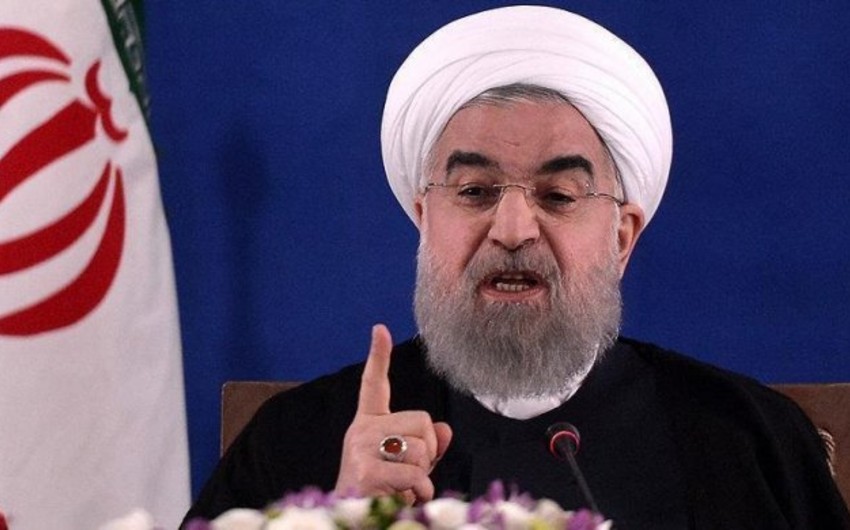Baku. 1 February. Since Iran is the closest state to Azerbaijan in terms of many issues, the developments in its political, social and cultural life seen interesting. The current year has not started successfully for the country. Many of the problems from the past have not yet been resolved.
February 11 will mark the 40th anniversary of the Iranian Revolution. Yesterday, the Supreme Leader of the Islamic Republic, Ayatollah Seyyed Ali Khamenei and Iranian President Hasan Rouhani visited the Mausoleum of Imam Khomeini, late founder of Iran, in southern Tehran. Actually, in this article, our goal is not to evaluate the benefits and disadvantages of the revolution for Iran. The purpose is just to remember briefly what happened in recent times in the neighboring country and look at the situation there before the anniversary.
In his speech at the mausoleum of Khomeini, Rouhani said the country had been subjected to the most severe pressures in the last 40 years. He even admitted a number of wrong steps taken by the government in the recent days.
He acknowledged that they had made a mistake by restricting Internet countrywide:
"There are dangers in new technologies, however these technologies will not be removed from people's lives. We cannot fight against the public will. It is die-hardism to resist technology and innovation. We made a mistake by blocking Internet. We considered that we could ban everything by an instruction. However, people overcame this obstacle by using the anti-filter software. The imposed restrictions have failed."

91-year-old Ayatollah Naser Makarem Shirazi calls him “antagonist of Islamic values": He acts as the President of a democratic country, not the Islamic Republic”.
In fact, such a feud among those who are considered to be reformers within the ruling conservative line have continued for many years. The main reason for this is that the power structures support this line. The country’s parliament is controlled by conservatives. There are also speeches against the reformers inside the government.
On January 28, a member of the Iranian parliament, Qasim Mirzai, spoke on the house arrest of politicians protesting the outcome of the 2009 presidential election. They chanted slogans and urged Mirzai to avoid the topic and talk about the economic problems of the people. Notably, presidential candidates representing domestic reformers Mir Hossein Mousavi and Mehdi Karroubi in 2009 are still under home arrest. Although Hassan Rouhani is heading the government, the executive branch, he seeks to draw attention to various political and social issues, since he has limited the circle of activities. The confessions mentioned above are an example. They also try to distract public attention from the representatives of this line by discussing various political events in the parliament.

Meanwhile, the country’s economy still relies on oil and natural gas revenues. Due to low demand in Tehran’s energy market, 1 million oil barrels (at the price $ 52.42/per barrel) remained in stock as of January 21.
Notably, starting from October last year, Iran sold its crude oil on the Tehran Stock Exchange in circumvention of the US-imposed sanctions. According to the Iranian Oil Ministry, the country sold a million barrels of oil for $ 74.85 per barrel on October 28, 2018, and 700,000 oil barrels for $ 64.97 per barrel on November 11 of the same year. As can be seen, Iran has faced serious problems with the sale of crude oil. Turkey, the closest exporter of Iranian oil, has suspended deals from November 2018. It was stated that from May 2018 Turkey reduced imports from Iran and cut them completely in November.
In general, the Iranian government is facing serious problems addressing economic issues. Today 1 dollar sells for 42500 rial. Despite economic problems, official Tehran does not seem to make any serious changes in policy towards Syria and Iraq. Vice President of Iran Eshaq Jahangiri visited Syria the other day. He met with Bashar al-Assad, the head of the regime and the Speaker of the Syrian Parliament Hammouda Sabbagh.

In recent days, reports have been made of blast and attacks on representatives of the power structures in Iran. A soldier and a police officer were killed as a result of an armed attack by unknowns in Bandar-e Mahshahr, where Arabs live densely. Two conscripts were wounded in two explosions in Zahedan City in Sistan and Baluchistan. Both cases have been investigated. Baluchistan and Khuzestan are sensitive regions of Iran. Even in September last year, 28 people were killed and 60 were wounded as a result of the firing of demonstrators in the central Al-Ahvaz city of Khuzestan province. The responsibility for the act of terror was claimed by the "Al- Patriotic Arab Democratic Movement in Ahwaz ", which is associated with Saudi Arabia. In January of this year, 15 people were killed in the crash of Boeng-707 military cargo plane in Iran.
What is happening in Khuzistan and Baluchistan is rather related to national relations in Iran. It is possible to assume that one of the reasons for the explosion or crash of the aircraft is sanctions. US has prohibited Iran to sell airplanes and spare parts. This creates a serious barrier to the purchase of new aircraft by Iran.
Thus, the Iranian government welcomes the 40th anniversary of the revolution in such a situation. Over the past few years, there have been no major changes in the country. The main reason why Iran is in this position is that its "enemies" are not changed. The inner forces, which accuse each other in such a situation do not dare to change their enemies.


 https://static.report.az/photo/63e379ff-8728-43b3-9f9a-6dcca07f3f20.jpg
https://static.report.az/photo/63e379ff-8728-43b3-9f9a-6dcca07f3f20.jpg

